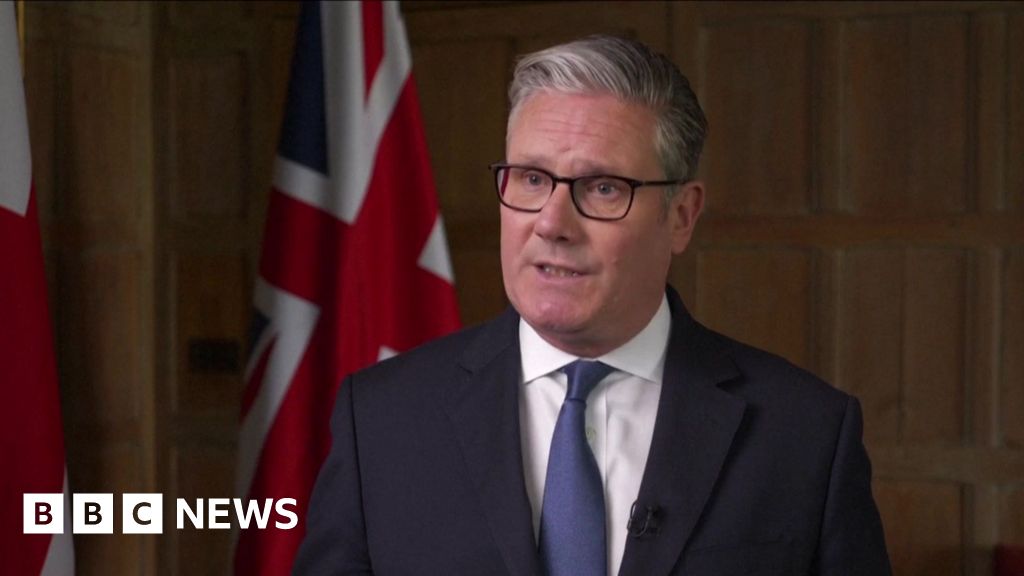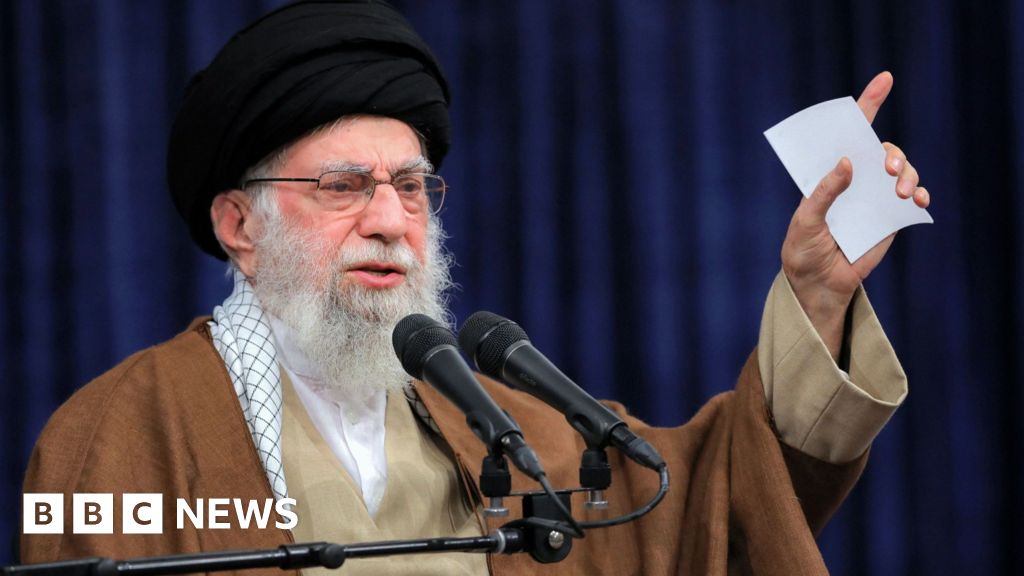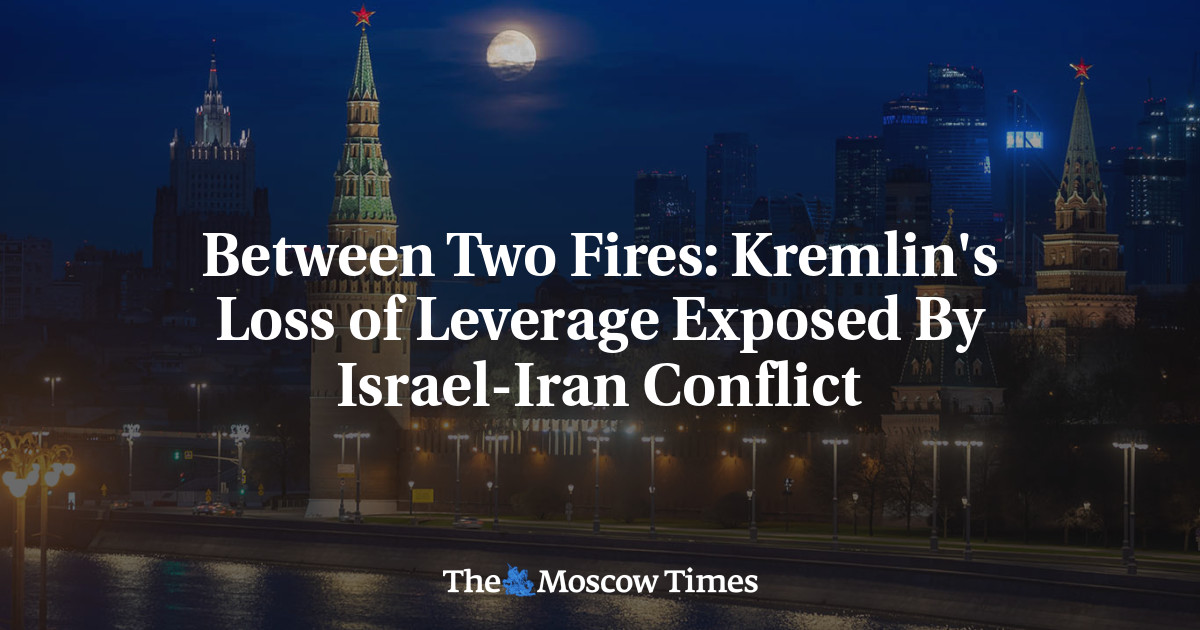Between Two Fires: Kremlin's Loss of Leverage Exposed By Israel-Iran Conflict
Powerless to influence the conflict, Russia nonetheless hopes it will be able to win Trump's favor.
The Kremlin is struggling to respond to the Israel-Iran conflict after it failed to anticipate the outbreak of hostilities, leaving it powerless to support a key ally, four sources in Russia’s foreign policy establishment told The Moscow Times.
Though it maintains ties with both countries, the Kremlin, bogged down in its own war in Ukraine, had not expected Israel to take such a bold and dangerous step — one that has raised questions about the survival of Tehran’s ruling regime, the sources said.
Nor did it expect that U.S. President Donald Trump, who has branded himself a “peacemaker,” would bow to pressure from Israeli Prime Minister Benjamin Netanyahu not to intervene.
The Moscow Times spoke to individuals in the Russian government and close to the Kremlin for this story. All of them spoke on condition of anonymity due to the sensitivity of the topic.
Israel launched a wave of air strikes on its arch-rival Iran’s infrastructure, including anti-missile sites and nuclear production infrastructure, over Tehran’s alleged moves toward building a nuclear weapon. The ensuing air war between the two countries, now entering its second week, has killed hundreds of people, including senior members of Iran’s military leadership and civilians.
“We believed in Trump’s unconventional behavior and his desire to preserve his image as a peacemaker,” said a retired high-ranking Kremlin official familiar with Russia’s foreign policy thinking. “We expected he might go for temporary arrangements that would allow Iran to save face without a complete ban on uranium enrichment. And that he would try to prevent an Israeli attack.”
A former Russian diplomat disagreed, criticizing what he saw as the Kremlin’s misreading of the regional dynamic.
“Israel successively dismantled hostile forces in neighboring countries, then the regime in Damascus fell and they [Israel] took the Golan Heights. It was clear Iran was next,” the former diplomat said.
Vladimir Putin and Iranian President Masoud Pezeshkian. kremlin.ru
Vladimir Putin and Iranian President Masoud Pezeshkian.kremlin.ru
The Kremlin assessed that Iran was in a relatively stable position based on Trump’s apparent openness to compromise and Tehran’s flexibility in recent negotiations on Iran’s nuclear program, according to a government official familiar with internal discussions.
“[Iran was] willing to discuss not a halt, but a reduction in uranium enrichment,” the official said.
Analysts from Russia’s Valdai Discussion Club, which is close to the Foreign Ministry, had identified potential risks including Iran’s withdrawal from the Nuclear Non-Proliferation Treaty and the Joint Comprehensive Plan of Action, followed by more sanctions.
But they regarded a direct Israeli military strike, let alone a regime change in Iran, as highly unlikely, The Moscow Times understands.
“That scenario was assigned a very low probability,” a senior Valdai official said.
Instead, events unfolded in the most dramatic and damaging way possible for both Tehran and Moscow.
“Our forecasts clearly didn’t pan out. Though the situation might still be stabilized,” the retired Kremlin official added.
Although Russia would like to support its embattled ally, it lacks the leverage to act alone, two sources close to the Kremlin’s foreign policy team and the Foreign Ministry said.
“We’ve made considerable diplomatic efforts to bring Israel and Iran back to the negotiating table,” a Russian diplomat said. “But they’ve all failed.”
Muted response
Moscow has not issued urgent calls for negotiations in the week since Israel launched its military operation against Iran.
Though Foreign Ministry released a statement critical of the offensive, it stopped short of signaling that Russia would take any further action.
Most telling was President Vladimir Putin’s silence, mirroring his muted response during the sudden ouster of Iran and Russia’s mutual ally Bashar al-Assad in Syria in December 2024.
Despite signing a strategic partnership agreement with Iran just two months ago, and despite Tehran supplying drones to Russia during the invasion of Ukraine, Putin refrained from commenting for several days.
This silence comes even as Moscow and Tehran have expanded their economic cooperation through projects like the North-South Transport Corridor and Russia’s construction of a nuclear power plant in Bushehr, with more projects in the pipeline.
Between Two Fires: Kremlin's Loss of Leverage Exposed By Israel-Iran Conflict
Powerless to influence the conflict, Russia nonetheless hopes it will be able to win Trump's favor.
The Kremlin is struggling to respond to the Israel-Iran conflict after it failed to anticipate the outbreak of hostilities, leaving it powerless to support a key ally, four sources in Russia’s foreign policy establishment told The Moscow Times.
Though it maintains ties with both countries, the Kremlin, bogged down in its own war in Ukraine, had not expected Israel to take such a bold and dangerous step — one that has raised questions about the survival of Tehran’s ruling regime, the sources said.
Nor did it expect that U.S. President Donald Trump, who has branded himself a “peacemaker,” would bow to pressure from Israeli Prime Minister Benjamin Netanyahu not to intervene.
The Moscow Times spoke to individuals in the Russian government and close to the Kremlin for this story. All of them spoke on condition of anonymity due to the sensitivity of the topic.
Israel launched a wave of air strikes on its arch-rival Iran’s infrastructure, including anti-missile sites and nuclear production infrastructure, over Tehran’s alleged moves toward building a nuclear weapon. The ensuing air war between the two countries, now entering its second week, has killed hundreds of people, including senior members of Iran’s military leadership and civilians.
“We believed in Trump’s unconventional behavior and his desire to preserve his image as a peacemaker,” said a retired high-ranking Kremlin official familiar with Russia’s foreign policy thinking. “We expected he might go for temporary arrangements that would allow Iran to save face without a complete ban on uranium enrichment. And that he would try to prevent an Israeli attack.”
A former Russian diplomat disagreed, criticizing what he saw as the Kremlin’s misreading of the regional dynamic.
“Israel successively dismantled hostile forces in neighboring countries, then the regime in Damascus fell and they [Israel] took the Golan Heights. It was clear Iran was next,” the former diplomat said.
Vladimir Putin and Iranian President Masoud Pezeshkian. kremlin.ru
Vladimir Putin and Iranian President Masoud Pezeshkian.kremlin.ru
The Kremlin assessed that Iran was in a relatively stable position based on Trump’s apparent openness to compromise and Tehran’s flexibility in recent negotiations on Iran’s nuclear program, according to a government official familiar with internal discussions.
“[Iran was] willing to discuss not a halt, but a reduction in uranium enrichment,” the official said.
Analysts from Russia’s Valdai Discussion Club, which is close to the Foreign Ministry, had identified potential risks including Iran’s withdrawal from the Nuclear Non-Proliferation Treaty and the Joint Comprehensive Plan of Action, followed by more sanctions.
But they regarded a direct Israeli military strike, let alone a regime change in Iran, as highly unlikely, The Moscow Times understands.
“That scenario was assigned a very low probability,” a senior Valdai official said.
Instead, events unfolded in the most dramatic and damaging way possible for both Tehran and Moscow.
“Our forecasts clearly didn’t pan out. Though the situation might still be stabilized,” the retired Kremlin official added.
Although Russia would like to support its embattled ally, it lacks the leverage to act alone, two sources close to the Kremlin’s foreign policy team and the Foreign Ministry said.
“We’ve made considerable diplomatic efforts to bring Israel and Iran back to the negotiating table,” a Russian diplomat said. “But they’ve all failed.”
Muted response
Moscow has not issued urgent calls for negotiations in the week since Israel launched its military operation against Iran.
Though Foreign Ministry released a statement critical of the offensive, it stopped short of signaling that Russia would take any further action.
Most telling was President Vladimir Putin’s silence, mirroring his muted response during the sudden ouster of Iran and Russia’s mutual ally Bashar al-Assad in Syria in December 2024.
Despite signing a strategic partnership agreement with Iran just two months ago, and despite Tehran supplying drones to Russia during the invasion of Ukraine, Putin refrained from commenting for several days.
This silence comes even as Moscow and Tehran have expanded their economic cooperation through projects like the North-South Transport Corridor and Russia’s construction of a nuclear power plant in Bushehr, with more projects in the pipeline.
















